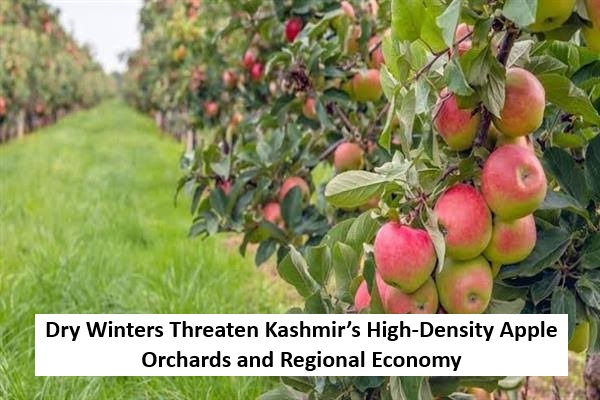
A series of dry winters is severely impacting Kashmir's high-density apple orchards, a sector that once revitalized the region’s Rs 8,000-crore apple industry. Introduced in 2015–16, high-density orchards yield more fruit per acre but require consistent irrigation, now threatened by an ongoing water crisis.
Growers across Kashmir report vanishing bore wells, drying tube wells, and depleted streams. Even iconic water sources like the Achabal spring in Anantnag dried up completely for the first time in history, underscoring the scale of the crisis.
Critical Water Shortage Strains Irrigation
According to the Irrigation & Flood Control Department, snowless winters and long dry spells have led to critically low water levels in Kashmir’s rivers and reservoirs. The Jhelum River is flowing below its already-reduced zero level. This shortage is disrupting the drip irrigation systems essential for high-density apple farming, especially during pre-harvest.
The J&K Meteorological Department reported a 79% rainfall shortfall in January and February 2024. Last year, from June to September, the region saw a 35% deficit, with Shopian district—Kashmir’s "apple town"—recording an alarming 81% shortfall.
Years of Below-Average Rainfall Raise Climate Alarms
Weather analysts attribute the worsening water crisis to long-term climate changes. Data shows consistent rainfall deficits over the past five years:
2024: 29% deficit (870.9 mm)
2023: 7% deficit (1146.6 mm)
2022: 16% deficit (1040.4 mm)
2021: 28% deficit (892.5 mm)
2020: 20% deficit (982.2 mm)
Snow is vital to Kashmir’s apple industry—not only for chilling hours needed for bud formation but also for maintaining soil moisture and disease control. Its absence has made high-density orchards more vulnerable despite drip irrigation systems.
Apple Production and Quality Decline
The dry spell in 2023 delayed harvesting, reduced fruit quality, and increased pest infestations. Many growers reported apple scalds and reduced juiciness, especially in key growing regions of north and south Kashmir.
Scientists at Sher-e-Kashmir University warn that dry winters weaken apple trees, increasing disease risks and reducing resistance to pests. Despite the benefits of early yield from high-density varieties like Jeromine and Gala Scarlet, inadequate rainfall is endangering returns on heavy investments.
Economic Fallout and Farmer Distress
Apple growers fear a deepening financial crisis. With over seven lakh families reliant on apple farming, any significant drop in production affects the broader economy. Many farmers have taken loans to set up high-density orchards, and recurring poor harvests could push them into debt.
High-density orchards are capital-intensive, with planting materials and drip systems costing several lakhs per acre. Without regular rainfall, these investments risk becoming unsustainable.
Government Plans and Grower Concerns
The J&K government aims to bring 5,500 hectares under high-density cultivation by 2026 under its new plantation scheme. With horticulture contributing around 9.5% of the state's GDP, this initiative is expected to boost local employment and the economy.
However, growers stress that without robust water infrastructure and adaptive policies, these efforts may fall short under intensifying climate stress.

 Share
Share



